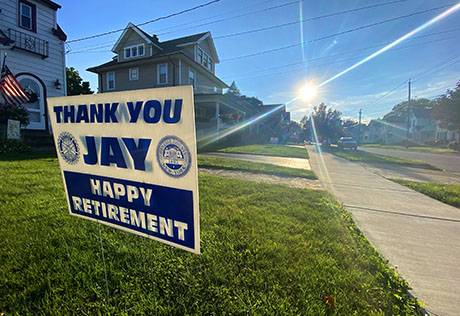Professional career ends, but life in Genesee County goes on for Jay and Ann Marie Gsell

While no longer on the payroll, outgoing Genesee County Manager Jay Gsell gave himself a new title as he bid farewell this afternoon at a ceremony attended by about 50 dignitaries, current and former legislators, local government colleagues and friends in front of the steps of the Old County Courthouse.
Gsell, directing his remarks to City Council members Eugene Jankowski Jr. and Kathleen Briggs, said that “Geno, since I walk the streets of Batavia on a regular basis, I’m on weed patrol now. So, Kathy (Briggs) you don’t have to worry about sending the city crews out. I’ll take care of this side – you get them to just do the Southside, and we’ll be good.”
The 45-minute event marked the end of a 27-year (actually 26 years and 364 days) career as the county’s chief administrative officer – a tenure that saw the county grow exponentially under Gsell’s guidance, energy and optimism.
After the presentation of proclamations, commendations and gifts, Gsell and his wife, Ann Marie, led a balloon launching, which served as a touching tribute to their daughter, Claire, who passed away in March 2009 at the age of 27.
“It was going to be her 28th birthday (on Sept. 6), so we decided that every year we would put 27 balloons out,” Gsell said. “In this case, we’re going to do it now. We figured why not, this is our favorite place.”
Getting 'Guidance' from Mary Pat
In a four-and-a-half-minute speech that capped the festivities – remarkably short for the effusive New Jersey native, Gsell talked about his daughter’s driving experiences, recalled meeting (the late legislator) Florence Gioia when he was about to be hired in 1993, expressed his pride in the team that leads the county and assured all that he and Ann Marie were in Batavia to stay.
“As it turns out, her (Claire) consistent guidance at Batavia High School was (guidance counselor) Mary Pat Hancock, and we always knew when we got a phone call, it was because Claire had gone to her first before coming to us with regard to what was or was not appropriate – including wrecking a car and also hitting somebody else in the parking lot. In fact, I think it was B.R. DeWitt’s wife,” Gsell remembered.
Hancock was the legislature chair when Gsell was hired and was one of today’s guest speakers, along with U.S. Congressman Chris Jacobs, State Sen. Michael Ranzenhofer, State Assemblyman Stephen Hawley, City Council President Jankowski, NYS Association of Counties President Jack Marren, current Legislature Chair Rochelle Stein and former Legislature Chair Robert Bausch.
Gsell said Claire went to Hancock first “to break the ice” before informing them of what had transpired.
“And, also, Rosalie Maguire, our insurance agent (who also was in attendance) had to keep changing the cars that were in our portfolio because Claire went through six cars in five years at one point,” he said. “She never got hurt except when one of our sheriff’s (deputies) had to actually pull up to her on Dodgeson Road and her car was facing the opposite direction from where she was headed to Darien Lake to work out there.
“She went to avoid a squirrel and ending up wrapping herself around a tree. So, needless to say, Frank Falleti (of Falleti Motors) was also our best friend as far as cars were concerned.”
Teamwork: 'It's How I was Raised'
Gsell said he knew he made the right choice when taking the Genesee County job – “the teamwork and cooperation, and how we get things done. This is really what I wanted to do. It’s how I was raised and also we as a group … things are in good hands with Matt (Landers, his successor); Vicki (Muckle, executive assistant to the county manager), and Tammi (Ferringer, recently appointed assistant county manager).”
As far as life after retirement, Gsell said “we call this home.”
“People keep saying, ‘So where are you going next? When’s the for sale sign (going up).’ There’s no for sale sign. The house is paid off, the dogs are happy, Ann Marie is reasonably happy except when I get anywhere near the television or the remotes, and as far we’re concerned, Genesee County and the City of Batavia are home, plain and simple,” he said.
Ann Marie took a few minutes to affectionately “roast” her husband, rattling off a number of his idiosyncrasies, including his technological impairment when it comes to Wi-Fi and TV remotes – “We call his TV chair the handicap parking spot,” she joked – and compulsive clearing of the dishes before people are done eating.
On a serious note, she went back 44 years ago when she was a single mother.
“I was a single mom with a 2 ½-year-old son and I couldn’t have chosen a better dad for my son,” she said, speaking of Christopher, who lives in Brooklyn.
Now It's on to the Next Chapter
Jay Gsell acknowledged that things will be “different come Monday, for the first time in 46-plus years.”
“And I’m not sure how I’ll react to that, but I think I will find a way,” he said. “And I know there are certain things like United Way and Rotary (Club) and also HomeCare & Hospice that will keep me busy at least on a volunteer basis.”
In closing, Gsell, who turns 69 on Saturday, said it was an honor to serve in Genesee County and the City of Batavia.
“We’re still going to be here, just know that – and again I can’t thank you enough,” he said. “It has been an honor and a privilege to work for this public sector government here for pretty much more than half of my career. So, thank you, thank you and thank you.”
Tributes from State, Local Lawmakers
- Marren presented Gsell with a mirror, coffee cups and a T-shirt with the words “Whisper words of wisdom … Let it be” on the front.
- Ranzenhofer mentioned Gsell’s expertise in working on the county water project, and extended the hope for “a great retirement with days filled with pleasure and joy.”
- Jacobs congratulated him on his “career of service in professional governing and the many other things you do for the community.”
- Hawley harkened back to the “Men of Rotary” calendar before saying that “no one has given more service to the Rotary Club and to the community than Jay Gsell. ... The guy is a workaholic … and an asset to the community,” he said.
- Jankowski said he will miss Gsell’s “enthusiasm and energy” and thanked him for helping the city whenever it needed help.
- Stein, calling it a special day for us, said “we all appreciate who he is and all he has done for our lives,” noting that Gsell served under six legislative chairs and 39 different legislators. “He wore us down with his enthusiasm and ability to keep going,” she said.
- Hancock recalled realizing Gsell’s professional experience, education and moral fiber during the interview process, “but we had no idea about the energy. ... He certainly was the man for the job, and he put his heart and soul into it,” she said, adding that she hopes Gsell starts his retirement with a nap.
- Bausch applauded Gsell for moving the county forward, mentioning Genesee Community College, the County Court Facility, Genesee County Airport, bringing water into the county and overall economic development.
Previously: Jay Gsell, 'Dean' of county managers, enters final week of his distinguished career
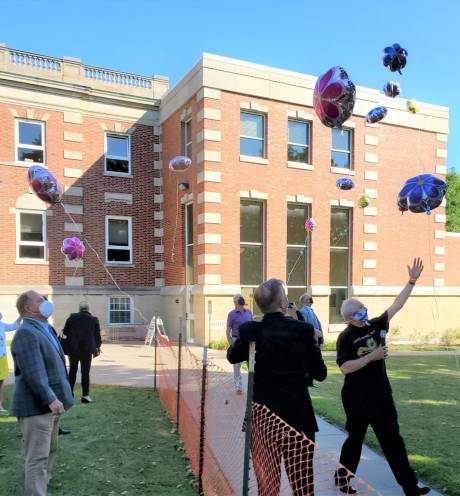
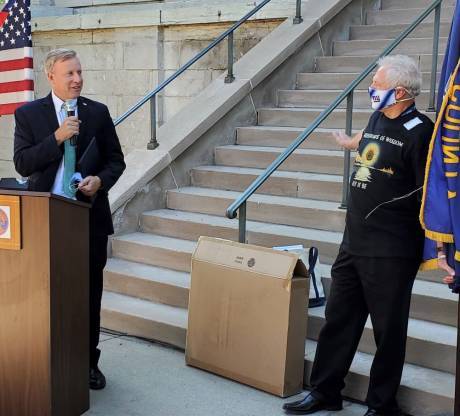
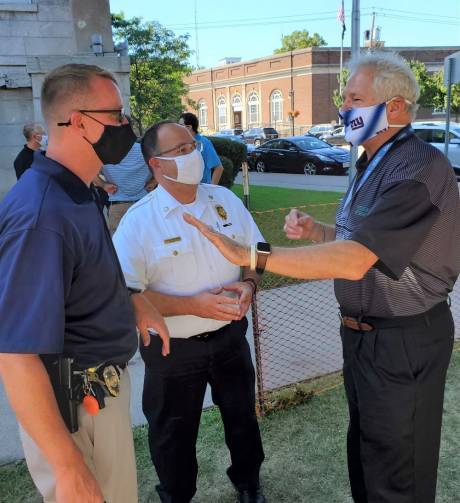
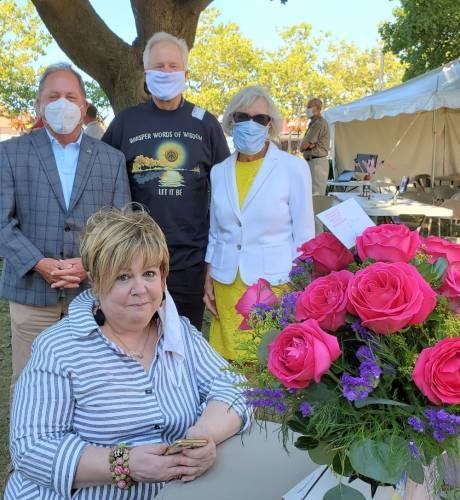
Photo at top: Jay and Ann Marie Gsell standing next to a chair, specially hand-painted for the occasion by Batavian Ed Leising; Photos at bottom in order -- Gsell (at right) and others releasing balloons in memory of the Gsell's daughter, Claire; U.S. Congressman Chris Jacobs congratulating Gsell; Batavia Police Chief Shawn Heubusch, left, and Fire Chief Stefano Napolitano sharing a moment with Gsell; Assemblyman Stephen Hawley and Mary Pat Hancock with the Gsells and the flowers presented to Ann Marie.
Photos by Mike Pettinella.

